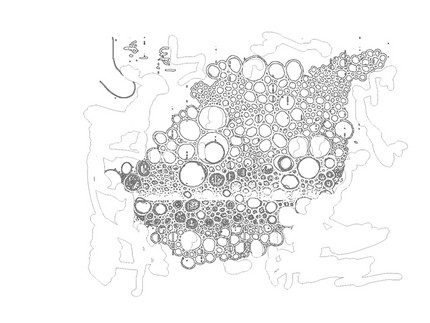Lecture Series 2017 "Minor Cosmopolitan Theory"
*Video recordings are now available for the following three lectures*
Gurminder Bhambra, "Postcolonial Cosmopolitanism: A Contradiction in Terms?"
Madina Tlostanova, "Beyond the local/global Dichotomy: decolonial cosmopolitanism as a tool for re-existence."
Alexandra Ganser, "Territorialities of Flight: The Refugee Narrative in Edwidge Danticat and Madeleine Thien."
*An exclusive interview with Paul Bandia is also available*
20th April - 29th June 2017
Description
The lecture series "Minor Cosmopolitan Theory" was a collaborative series among our RTG fellows to explore different topics that could be interpreted through the minor cosmopolitanism frame. The series took place from 20th April to 29th June 2017 with an accompanying seminar for each lecture. These topics explored included:
- Feminist Theory
- Postcolonial Theory
- Border Thinking
- Border Studies
- Queer Theory
- Intersectionality
- Postcolonial Literature
- Critical Race Theory
- Translation
Program:
- 20 April, 2017 at 18:00 - 20:00
The Erotics of Cosmopolitanism: ‘Latin American Passion’ in European Popular Culture
Stefanie Boulila - 27 April, 2017 at 18:00 - 20:00
Postcolonial Cosmopolitanism: A Contradiction in Terms?
Gurminder Bhambra - 11 May, 2017 at 18:00 - 20:00
Beyond the Local/Global Dichotomy: Decolonial Cosmopolitanism as a Tool for Re-existence
Madina Tlostanova - 18 May, 2017 at 18:00 - 20:00
Territorialities of Flight in Edwidge Danticat & Madeleine Thien
Alexandra Ganser - 08 June, 2017 at 18:00 - 20:00
Queer Ethics of Reading: The Archive of Slavery Between Entanglement and Counterpoint
Elahe Haschemi Yekani - 22 June, 2017 at 18:00 - 20:00
Afro-Culture: On Being Human and Other Myths
Natasha Kelly - 29 June, 2017 at 18:00 - 20:00
Postcoloniality, Translation and Minor Literatures
Paul Bandia
Lecture/Seminar 1 - The Erotics of Cosmopolitanism: 'Latin American Passion' in European Popular Culture
Stefanie Boulila (Georg-August University Göttingen)
The Erotics of Cosmopolitanism: 'Latin American Passion' in European Popular Culture
In hegemonic conceptualisations, cosmopolitanism is the epitome of ‘living with difference’ (Ahmed 2000; Binnie et al. 2006). For Sara Ahmed (2000) cosmopolitanism connects to multiculturalism not only in terms of how it allows the nation or the city to incorporate racialised difference but also in terms of its ambiguity. In this talk I aim at theorising cosmopolitanism in Europe as an ambiguous discourse that, similarly to multiculturalism, allows conversations about race without actually naming it (Lentin and Titley 2011). I do so by examining the separation between ‘good’ difference that can be commodified and incorporated and ‘difference’ that is deemed dangerous for the multicultural nation or the cosmopolitan city. Throughout the history of European colonialism, the simultaneous incorporation and rejection of Others has a longstanding tradition (McClintock 1995; Savigliano 1995; Goldberg 2002). In my talk I explore discourses around ‘Latin American passion’ in European popular culture and illustrated how the racialised quality of the Latina/o body operates as a desirable and yet highly ambiguous commodity. Focusing on the figuration of the hyper-sexual Latina and narratives of machismo in popular culture, I argue that Latinidad is mediated as an exoticised commodity object for the European cosmopolitan and post-feminist consumer. As a ‘break’ from the burden of ‘egalitarian’, ‘progressive’ Europeanness, racialised Latinidad invites cosmopolitans to indulge in a more archaic and ‘sexy’ past.
Thursday, April 20th 2017; 18-20 // Campus Neues Palais, Building 9, Room 2.15 (second floor)
Seminar with Stefanie Boulila (Georg-August University Göttingen) - Intersectionality: A Critical Introduction
Each lecture was accompanied by a seminar conducted by the speaker, which picks up on the themes and talking points of the lecture.
Friday, April 21st 2017; 10-12
Short Bio
Stefanie C. Boulila is a postdoctoral researcher in gender studies at the University of Goettingen (D). She wrote her AHRC-funded PhD at the University of Leeds (UK) in the School of Performance and Cultural Industries as well as in the School of Sociology and Social Policy. Her thesis explored the racial dimension of gender and sexuality discourses among salsa dancers in Switzerland and England. Her work has appeared in various edited collections, including Lesbian Geographies: Gender Place and Power (Ashgate) as well as in the Graduate Journal of Social Science. Her latest article on the racial politics of the German refugee debate will appear later this year in the European Journal of Women’s Studies. Stefanie is currently working on her first monograph entitled Race in Post-racial Europe: An Intersectional Analysis.
Lecture/Seminar 2 - Postcolonial Cosmopolitanism: A Contradiction in Terms?
Gurminder Bhambra (University of Warwick)
Postcolonial Cosmopolitanism: A Contradiction in Terms?
Most discussions of cosmopolitanism start with its intellectual genealogy being a European one, associating ‘being cosmopolitan’ (as a practice) with being in the West. More recent discussions of cosmopolitanism, such as by Habermas and Beck, have sought explicitly to tie the concept to the emergence and development of the project of European Union. Rarely do such understandings, however, also take into account European domination over much of the world which occurred contemporaneously as one of the conditions of cosmopolitanism. Nor is there much acknowledgement that there have been cosmopolitan practices and the development of cosmopolitan ideas in other parts of the world outside of European contact, sometimes developed in relation to European contact, and not subordinate to it. In this talk, I address the possibilities for a ‘postcolonial cosmopolitanism’ and discuss what work we would need to do to ensure this.
Thursday, April 27th 2017; 18-20 // Campus Neues Palais, Building 9, Room 2.15 (second floor)
Seminar with Gurminder Bhambra (University of Warwick)
Each lecture was accompanied by a seminar conducted by the speaker, which picks up on the themes and talking points of the lecture.
Friday, April 28th 2017; 10-12
Short Bio
Gurminder K. Bhambra is Professor of Sociology at the University of Warwick and Guest Professor of Sociology and History at the Centre for Concurrences in Colonial and Postcolonial Studies at Linnaeus University, Sweden. Her research interests are primarily in the areas of historical sociology and contemporary social theory and she is also interested in the intersection of the social sciences with recent work in postcolonial and decolonial studies. She is author of Connected Sociologies (Bloomsbury, 2014) and Rethinking Modernity: Postcolonialism and the Sociological Imagination (Palgrave, 2007) which won the 2008 Philip Abrams Memorial Prize for best first book in sociology. She has edited and co-edited a number of books and journal special issues, including, most recently, European Cosmopolitanisms (Routledge 2016). She set up the Global Social Theory website to support students and academics interested in social theory in global perspective.
Lecture/Seminar 3 - Beyond the Local/Global Dichotomy: Decolonial Cosmopolitanism as a Tool for Re-existence
Madina Tlostanova (Linköping University)
Beyond the Local/Global Dichotomy: Decolonial Cosmopolitanism as a Tool for Re-existence
The enlightenment model of cosmopolitanism and the subsequent evolvement of the normalized binary opposition of local and global are unable to reflect the complexity of contemporary world. Today’s reemergence of traditionalist and antiglobal discourses can be seen as a revolt from within modernity, as a resurgence of exclusionary locality which rejects both the transnational cosmopolitan and the discarded (by the global coloniality) precarious other. In the rhetoric of modernity/coloniality the local is habitually presented as the preliminary stage for the global and often associated with negatively marked tradition. Moreover there have always existed people who have never been allowed into the shiny cosmopolitanism of the Western globe-trotters. For such inhabitants of exteriority borders as boundaries have remained intact and even multiplied in the last several decades. This does not mean that they are not cosmopolitan, though survival and coalitional resistance cosmopolitanism is different from the Kantian model. What makes it different and how does it correlate with (critical) sensibilities of the global North? How is decolonial cosmopolitan model expressed through aesthetic and poetological principles? Can it potentially serve as a positive ground for building the world anew and turning negative resistance into positive re-existence? These questions are addressed in the lecture.
Thursday, May 11th 2017; 18-20 // Campus Neues Palais, Building 9, Room 2.15 (second floor)
Seminar with Madina Tlostanova (Linköping University)
Each lecture was accompanied by a seminar conducted by the speaker, which picks up on the themes and talking points of the lecture.
Friday, May 12th 2017; 10-12
Short Bio
Madina Tlostanova is a decolonial theorist and writer. She is professor of postcolonial feminism at the Department of Thematic Studies (Gender studies) at Linköping University (Sweden). Tlostanova focuses on decolonial thought, postsocialist studies, non-Western feminisms, contemporary art and fiction. She was a DAAD visiting professor in the University of Bremen (Germany, 2006, 2011), an international researcher at Duke University (USA, 2007), a visiting scholar at Linköping University (2013) and Södertorn University (Sweden, 2014). Tlostanova has authored nine scholarly books and over 260 articles, including Gender Epistemologies and Eurasian Borderlands (Palgrave Macmillan, 2010), Learning to Unlearn: Decolonial Reflection from Eurasia and the Americas (co-authored with Walter Mignolo, Ohio State University Press, 2012) and Postcolonialism and Postsocialism in Fiction and Art: Resistance and Re-existence (Palgrave Macmillan, 2017). She has also authored two fictional books: In Your World I Am a Stranger (Moscow, URSS, 2006, under the pseudonym of Dina Damian) and Zalumma Agra (Moscow, Sputnik +, 2011).
Lecture/Seminar 4 - Territorialities of Flight: The Refugee Narrative in Edwidge Danticat and Madeleine Thien
Alexandra Ganser (University of Vienna)
Territorialities of Flight: The Refugee Narrative in Edwidge Danticat and Madeleine Thien
In contemporary philosophy and cultural theory, the terms flight and territorialization are tightly connected to concepts introduced by French poststructuralists Gilles Deleuze and Félix Guattari, most notably in A Thousand Plateaus. By what they call “lines of flight”—unpredictable, unruly routes defying spatial control—, they refer to the break-up of a hegemonic spatial semantics through the mobility associated with the figure of the nomad. The concept is closely connected with that of “deterritorialization“ as a strategy to contravene normative spatial structures—“striated” space—, and to produce “smooth space,” space that escapes structuration and control. For Deleuze and Guattari, deterritorialization has a positive value: “write, form a rhizome [i.e., networks of unstructured offshoots and trajectories across smooth spaces], increase your territory by deterritorialization” (1987/1980: 11). In this light, my title is deliberately oxymoronic, as it associates lines of flight with the territorialization process rather than deterritorialization. Postcolonial criticism, most notably Gayatri Spivak, has held Deleuze’s philosophy accountable for reaffirming a European universal (male) subject. Even these critics, however, have not debated the Deleuzian conception of lines of flight and deterritorialization. These concepts appear not just as starkly normative but also as grossly romantic if applied to refugee subjectivities—subjectivities deprived of agency and involuntarily deterritorialized in toto—physically, culturally, and in terms of identity. In my lecture, I am asking how literature and its readers can perform the work of a conceptual corrective to such fashionable theories. I am taking up the prevalence of flight to Western societies, which are today exhorted once more to shelter the “huddled masses yearning to breathe free / The wretched refuse“ of so many shores, “the homeless“ and “tempest-tossed,“ to recall Emma Lazarus’s “The New Colossus“ (1883) and examine the territorialities of flight articulated in the short story “Children of the Sea“ by Haitian-American writer Edwidge Danticat (1991) and the novel Dogs at the Perimeter by the Chinese-Malaysian Canadian Madeleine Thien (2011). Danticat’s story focuses on the Haitian “boat people“ that attempted to reach Florida shores in the 1980s and 1990s, while Thien examines the Red Khmer genocide in Cambodia and its consequences for the children that came to Canada as refugees. Both are informed by what Achille Mbembe has called the necropolitics of genocide and demographic control rather than by the immigrant narrative, which usually takes off with the migrants’ arrival and focuses on immigrant life in a new environment. This necropolitics, as Mbembe claims, dictates who may live and who must die, who finds shelter and who is left to drown; accordingly, both texts offer insights into such precarious, deterritorialized subjectivities and perform a grueling critique of the necropolitical structures that continue to produce transoceanic diasporas.
Thursday, May 18th 2017; 18-20 // Campus Neues Palais, Building 9, Room 2.15 (second floor)
Seminar with Alexandra Ganser (University of Vienna)
Each lecture was accompanied by a seminar conducted by the speaker, which picks up on the themes and talking points of the lecture.
Friday, May 19th 2017; 10-12
Short Bio
Alexandra Ganser is professor for American literary and cultural studies and Executive Director of the Centre for Canadian Studies (ZKS) at the University of Vienna as well as Key Researcher of the Interdisciplinary Research Platform “Mobile Cultures and Society“ (univie.ac.at/mobilecultures). Her research interests include mobility studies, early American and antebellum popular culture, gender studies, transatlantic American studies, Native American studies, and ecocriticism. Her current book project, sponsored by the Austrian Science Fund (FWF), examines transatlantic representations of piracy before the Civil War and is titled Crisis and Discourses of (Il)Legitimacy in Transatlantic Narratives of Piracy, 1678-1865 (to be published with Palgrave Macmillan this year). She holds a doctoral and postdoctoral degree in American literary and cultural studies from the University of Erlangen-Nuremberg, Germany. She was Christoph-Daniel-Ebeling Fellow at the American Antiquarian Society (2010) and is Fulbright Alumna (University of Oklahoma at Norman, 2003/04). Other book publications include: Roads of Her Own: Gendered Space and Mobility in American Women’s Road Narratives, 1970-2000 (dissertation; Rodopi, 2009); Pirates, Drifters, Fugitives: Figures of Mobility in American Culture and Beyond (ed. with Heike Paul & Katharina Gerund, 2012) and Transgressive Television: Politics, Crime, and Citizenship in 21st-Century American TV Series (ed. with Birgit Daewes and Nicole Poppenhagen, Winter 2015).
Lecture/Seminar 5 - Queer Ethics of Reading: The Archive of Slavery between Entanglement and Counterpoint
Elahe Haschemi Yekani (Flensburg University)
Queer Ethics of Reading: The Archive of Slavery between Entanglement and Counterpoint
In extension of, but also in distinction from, Edward Said’s famous conception of contrapuntal reading strategies that emphasise the influence of the colonies on metropolitan lifestyles, I propose that the emergence of modern Britishness was shaped globally already in the late eighteenth and early nineteenth century before the high time of imperialism and should be related more strongly to the debate on the abolition of slavery. I suggest to read literary texts as part of an entangled (rather than contrapuntal) literary history of British writing. My contribution to the lecture series “minor cosmopolitan theory” therefore begins with a methodological reflection on the ethical challenges of reading, particularly when dealing with the archive of slavery today. Contrasting the more overtly politicised queer impulse of embracing negative feelings, which critics such as Ann Cvetkovich propose, with what Stephen Best calls a depsychologising form of “surface reading”, I advocate a return to Sedgwickian queer reparative reading strategies that might function as a link between these supposedly contradictory methodological approaches. Following this theoretical reflection, I revisit Said’s landmark reading of Jane Austen’s Mansfield Park (1814) to discuss how familial feeling becomes increasingly permeable for subjects like Fanny Price and Robert Wedderburn, the radical orator and author of The Horrors of Slavery (1824), from the margins of the colonies and Britain’s class-bound society simultaneously. This focus on their entanglement also resists a clear-cut spatial binary of the colonial periphery versus the cosmopolitan centre and links questions of class and the new imperial and gendered ordering of Britain’s affective make-up in the course of the nineteenth century.
Thursday, June 8th 2017; 18-20 // Campus Neues Palais, Building 9, Room 2.15 (second floor)
Seminar with Elahe Haschemi Yekani (University of Flensburg)
Each lecture is accompanied by a seminar conducted by the speaker, which picks up on the themes and talking points of the lecture.
Friday, June 9th 2017; 10-12
Short Bio
Elahe Haschemi Yekani is Junior Professor of English Literature at the University of Flensburg. Previously she was a fellow at the Institute for Advanced Study Konstanz and Assistant Professor at the Department of English at the University of Innsbruck in Austria. She is the author of The Privilege of Crisis. Narratives of Masculinities in Colonial and Postcolonial Literature, Photography and Film (Campus 2011) and co-editor of Erlöser. Figurationen männlicher Hegemonie (transcript 2007, ed. with Sven Glawion and Jana Husmann-Kastein) as well as Queer Futures: Reconsidering Ethics, Activism, and the Political (Ashgate 2013, ed. with Eveline Kilian and Beatrice Michaelis). Currently, she works on her second book, in which she traces an entangled literary history of canonical bourgeois novels of the late 18th and 19th century with the earliest written testimonies of Black British writers. Her research interests include the Anglophone novel, Queer Theory, Postcolonial and Gender/Masculinity Studies.
Lecture/Seminar 6 - Afro-Culture: On being Human and other Myths
Natasha A. Kelly
Afro-Culture: On being Human and other Myths
Cosmopolitanism is the ideology that all human beings belong to a single community, based on a shared morality, equal economic relations, and a just political system that reaches beyond national borders. The concept is often related to geographical locations, rather than to peoples’ histories within these locations. For example, Berlin is often defined as Germanys’ most cosmopolitan city due to its high rate of diversity. But to what extent does this philosophy actually apply to the histories of its people? How can we understand the concept of cosmopolitanism without understanding the ‘concept of being’? Along what W. E. B. Du Bois’ coins ‘the color-line’ (1903), I trace the journey of Black Germans out of what Frantz Fanon (1952) calls the ‘zone of nonbeing’, where the history of becoming human began for colonized, enslaved, and marginalized peoples, into a ‘zone of being’, from where cosmopolitan cities such as Berlin can eventually be (re-)imagined. As cultural critic Mark Dery (1993) proposes, I examine how a community whose past has deliberately been erased, and whose presence is subsequently absent can design a possible future, in which according to Kwame Anthony Appiah (1997) individuals from varying locations enter relationships of mutual respect despite their differing backgrounds, beliefs and histories. In contrast to the Hegelian philosophy of existence, I introduce the concept of Afro-Culture as an intersectional matrix of knowledge that consists of historical, realistic, and futuristic elements, and concentrate on the past, present, and future of Black bodies in Germany from a Black German post-feminist perspective. Concurrently, my lecture can be understood as a critique of European modernity as well as a socio-political guidance of transnational solidarity and social change.
Thursday, June 22nd 2017; 18-20 // Campus Neues Palais, Building 9, Room 2.15 (second floor)
Seminar with Natasha A. Kelly
Each lecture was accompanied by a seminar conducted by the speaker, which picks up on the themes and talking points of the lecture.
Friday, June 23rd 2017; 10-12
Short Bio
Natasha A. Kelly has a PhD in Communication Studies and Sociology with her research focus on colonialism and feminism. Born and bred in the United Kingdom and raised in Germany, Natasha was the elected representative of the European Union in the Council for Integration and Migration of the Berlin Senate (2012 – 2016). Natasha considers herself to be an “academic activist” (two important features that can be seen individually, but never separately from each other). Rooted in the Pan-African culture of her Jamaican heritage her political and academic works relate to the past, present, and future of the African Diaspora in Germany. As an editor, author and lecturer at diverse private and state universities in Germany and Austria she uses different art forms to materialize “untouchable” phenomena like racism and sexism as demonstrated in her exhibition EDEWA (http://www.edewa.info). This enables her to connect theory and practice and highlight the importance and necessity of the transfer-lines between politics, academia and society. Her dissertation titled: “Afrokultur. ‘der raum zwischen gestern und morgen’” (Unrast Verlag 2016) deals with the life and works of W. E. B. Du Bois, Audre Lorde and May Ayim, three Black knowledge workers who framed Afro-German identity.
Lecture/Seminar 7 - Postcoloniality, Translation and Minor Literatures
Paul Bandia (Concordia University, Montreal)
Postcoloniality, Translation and Minor Literatures
This lecture aims at highlighting current trends in postcolonial translation theory dealing with issues related to intercultural writing, multilingualism and literary heteroglossia in minority literatures. The latter includes literatures from the postcolony, the diaspora and contexts of migration. The discussion focuses on the conceptualization of translation as a paradigm or scientific construct in defining the contours and positioning of minor literatures within current discourse on globalization and cosmopolitanism.
Thursday, June 29th 2017; 18-20 // Campus Neues Palais, Building 9, Room 2.15 (second floor)
Seminar with Paul Bandia (Concordia University, Montreal)
Each lecture was accompanied by a seminar conducted by the speaker, which picks up on the themes and talking points of the lecture.
Friday, June 30th 2017; 10-12
Short Bio
Professor Paul Bandia is professor of Francophone Studies at Concordia University in Montreal specialising in the field of translation studies with a focus on African literatures. He is the author of the book Translation as Reparation: Writing and Translation in Postcolonial Africa (2008), and Orality and Translation (2016) as well as several edited and co-edited volumes.
Interview with Paul Bandia
Following his lecture as part of the lecture series Minor Cosmopolitan Theory at the University of Potsdam in June 2017, Prof Bandia was kind to respond to a set of questions by Yann Le Gall and Moses März, who are members of the RTG. In this conversation, he provides a glimpse into the field of postcolonial translation theory, describes how his work relates to 'minor cosmopolitanisms' and shares his views on the notion of reparation through translation as well as on current trends in African literature, such as afropolitanism.
What are some of the main characteristics of an African Postcolonial Translation Theory?
It is an interesting question because it's not just about African post-colonialism but about post-colonialism as a whole. Postcolonial translation theory aims to address the lacuna that exists in dealing with literatures or contexts that are minor, subaltern or peripheral. This is always in relation to what you would call the imperial centre.Now what are the characteristics of postcolonial translation? They are different from your regular normative translation studies. By ‘normative’ I mean situations where we mainly think of translation from one monolithic, monolingual entity onto another monolithic, monolingual entity, such as going from standard French to standard English or vice versa. What postcolonial theory does differently is that it finds the monolingual translation project to be limited and not able to account for postcolonial experiences. In other words, postcolonial experiences are often plurilingual, plurivocal, heteroglossic: all these terms that speak to a sense of multiplicity; an essential heterogeneity. You need a theory or an approach that can account for such texts and should then be different than what we have known in translation studies since the 1950s when translation studies was basically the understanding of contrastive linguistics and comparative stylistics...








